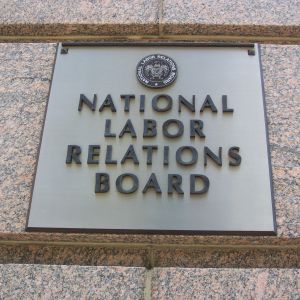Poll after poll indicates Americans value their privacy. Yet government is a top offender in this regard, with federal agencies infringing on private citizens’ information or lax security that leads to a privacy breach.
People may not know it yet, but the National Labor Relations Board is one federal agency trampling those privacy concerns. The federal labor board, which is charged with conducting private-sector union elections, is now implementing an “ambush election” rule overhauling the union election process.
The NLRB’s rule drastically shortens the time period for union organizing elections, possibly to as little as 11 days after a union files a petition. That gives employees little time to educate themselves on the pros and cons of unionizing. The rule also creates potential conflicts concerning voter eligibility, but relegates any resolution to eligibility until after the election.
But the greatest threat from the ambush election rule is to worker privacy. Employers are compelled to provide employee contact information to union organizers, including personal cell phone numbers, email addresses and work schedules — without an opt-out provision for those who prefer not to share personal data or have a third party know when they are home or at work. This invasion of privacy runs the risk of increased identity theft, intimidation and harassment of workers around the country.
This privacy breach is not of concern to the NLRB regulators, who have a plain bias for organized labor. And under the new rule, sure enough, unions win more elections — 1,128 a 10-year high, a Bloomberg BNA analysis shows. Not only that, more elections are being held — 1,628 a five-year high. That means more workers will have their private information wrested away. Unions get workers’ private information when an election is conducted, even if they lose the election. It’s not as if workers can get that information back once it’s out there.
Thankfully, the NLRB’s brazen attitude toward privacy may hit a roadblock. A lawsuit filed by the Associated Builders and Contractors of Texas could undo the provision. Politico recently reported that a 5th Circuit panel took issue with the rule’s provision that employers must fork over workers’ private information to union organizers during a union election drive.
At the panel, NLRB lawyer Marissa Ann Wagner claimed the agency took to heart privacy concerns, but Judge Catharina Haynes retorted, “See I’m not seeing the sensitivity. … I’m just seeing the board go ‘Oh, well, yeah, could be a problem, but we told unions not to misuse (the information) so that solves the problem. It’s kind of an airy, dismissive attitude.”
The NLRB is well aware of the problems associated with the privacy provisions of the rule. Numerous groups pointed out the privacy concerns to the NLRB during the rulemaking comment period last year. And the NLRB acknowledged such concerns in agency guidance regarding the ambush election rule. It should also be aware because well before the ambush election rule was implemented, unions have been known for misusing workers’ private information.
For example, in 2010, a case before the NLRB involved agents of the Communication Workers of America Local 1103 in Connecticut using private information to harass a worker. The CWA obtained Patricia Pelletier’s personal contact information and signed her up for thousands of unwanted magazine subscriptions and consumer products. She was billed thousands of dollars by magazine publishing companies and spent hours each day unsubscribing from the magazines. Ms. Pelletier received this awful treatment simply because she tried to decertify her union. The ambush election rule only makes such retaliatory behavior easier to deploy against other hard-working men and women.
Protecting worker privacy should be a bipartisan issue. Why can’t both sides agree that workers should have total control in who may attain their private information?
In the first year of the rule, tens of thousands of workers’ private information has been exposed. That is enough. Congress should act to protect worker private information. Simply, allow workers to decide whether they want to share private information with a union, or not.

